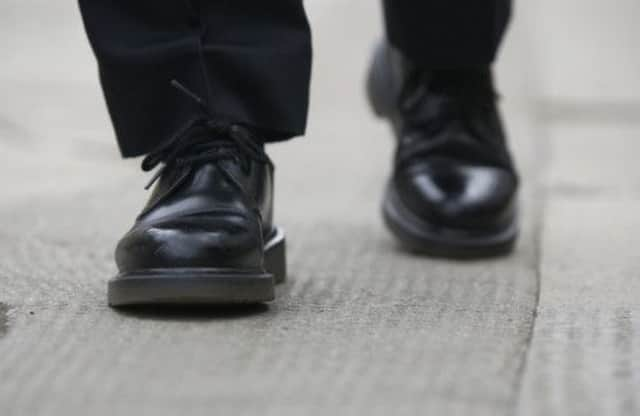Euan McColm: More police doesn’t mean a better force


The pledge was dreamed up at a meeting of nationalist MSPs back in 2002, when John Swinney was party leader. There was no consultation with serving officers or reference to expert studies. What happened was that one MSP suggested the SNP should include in its manifesto, for the following year’s election, a promise of 500 more cops. This being a creative session, at which ideas were to be shared and developed, a second MSP asked: “Why don’t we make it a thousand?”
Everyone present agreed that 1,000 was a far larger number than 500, and a flagship policy was born.
Advertisement
Hide AdAdvertisement
Hide AdAlex Salmond reiterated the pledge when he returned as SNP leader in 2004 and it has been at the front of the nationalists’ campaign ever since, even though the number was plucked out of thin air.
It’s worth reflecting on the arbitrary nature of that decision to hire another 1,000 officers as the recently created national police force begins to make huge – and hugely controversial – cuts.
A little more than six months after its formation, Police Scotland must find £60 million of savings. Chief Constable Sir Stephen House proposes to achieve this by closing 65 of the 214 front desks in local stations, nationwide. During First Minister’s question time on Thursday, Liberal Democrat leader Willie Rennie said he had been told by senior officers that seven of the country’s ten control rooms – where 999 calls are received – were also to close. The force later confirmed that it was considering options.
One of the drivers of the decision to merge eight forces and the Scottish Crime and Drug Enforcement Agency into one national organisation was the opportunity to save £1.7 billion over the next 15 years. The restructuring itself was supposed to create these savings, so this extra £60m of cuts is a nasty surprise.
Nonetheless, Sir Stephen defended the closure plans as offering value for money and told the national police board that those stations with the lightest “footfall” would be prioritised for front desk closure. The Chief Constable is quite the politician, but he struggled to make the cuts sound at all appealing.
For the same reasons that we like the idea of an extra 1,000 officers, we like the idea of local stations where we can, if we have to, report crime. We like to feel that there’s a real police presence in our communities, that help for whatever imagined calamity might befall us is never for away. It was understanding of this truth that created the SNP’s promise of extra officers.
But that promise – now fulfilled – has created the financial problems facing Police Scotland. In June, it was announced that Scotland had 17,324 police officers – an increase of 1,090 since the SNP was first elected in May 2007. Even if each of those new starts is on the basic rate of pay, then that means an increase in the annual salary bill of more than £27m. The necessary savings could be found in a little more than two years if it wasn’t for the increase in frontline staff. But that would mean, of course, the loss of all those extra (and terribly reassuring) new officers. This might not be such an awful thing.
Crime rates have fallen in Scotland in recent years. Last week, it emerged homicide levels were at their lowest in almost four decades. But there’s no evidence that crime is falling because of an increase in the number of police officers. In fact, crime has been falling steadily across the UK, Europe and the USA for decades. We’re safer now than we were in the 1980s. This trend was well established before the SNP began instructing chief constables to hire more staff. We may not actually need these officers.
Advertisement
Hide AdAdvertisement
Hide AdOnly the stoniest heart could fail to feel some sympathy for House. The First Minister was enthusiastically vocal about the plan to get more officers out on the street and he can be depended upon to return frequently to the subject. The employment of many more police – which is officially “good news” – is very much a matter for Salmond. Asked this week about the closure of front desks and the loss of staff from control rooms, the First Minister said these were “operational” issues. Bad news is a matter for the Chief Constable.
A single police force does have things in its favour. Along with the essential financial savings, a collective expertise and focus at a national level on complex cyber crime, on economic crime, on sex offences, should benefit every community.
But its flaws are becoming apparent. In the creation of Police Scotland, 1,200 back-room staff lost their jobs. In many cases, these were staff doing work crucial to ensuring that those extra bobbies on the beat were actually on the beat. With the loss of so many administrative staff, some officers complain that they’re being kept away from frontline duties to deal with office work.
There are tensions, too, in the organisation, with some complaining that Sir Stephen has created the new force in the image of his Strathclyde Police, without thought to different approaches in different parts of Scotland. A crackdown on licensed saunas in Edinburgh caused some resentment among officers who’d previously worn the badge of the Lothian and Borders force.
House is hamstrung by the Scottish Government’s determination to maintain increased officers numbers. And, as long as that’s the case, Salmond’s claim that cuts are purely “operational” matters is disingenuous. These are cuts caused by political decision making. As he slices the Police Scotland budget, Sir Stephen has no choice but to make every decision on the basis that it allows him to keep, on behalf of the Scottish Government, a barely thought-out political promise that puts winning votes before considering the needs of a modern police force. «
Twitter: @euanmccolm